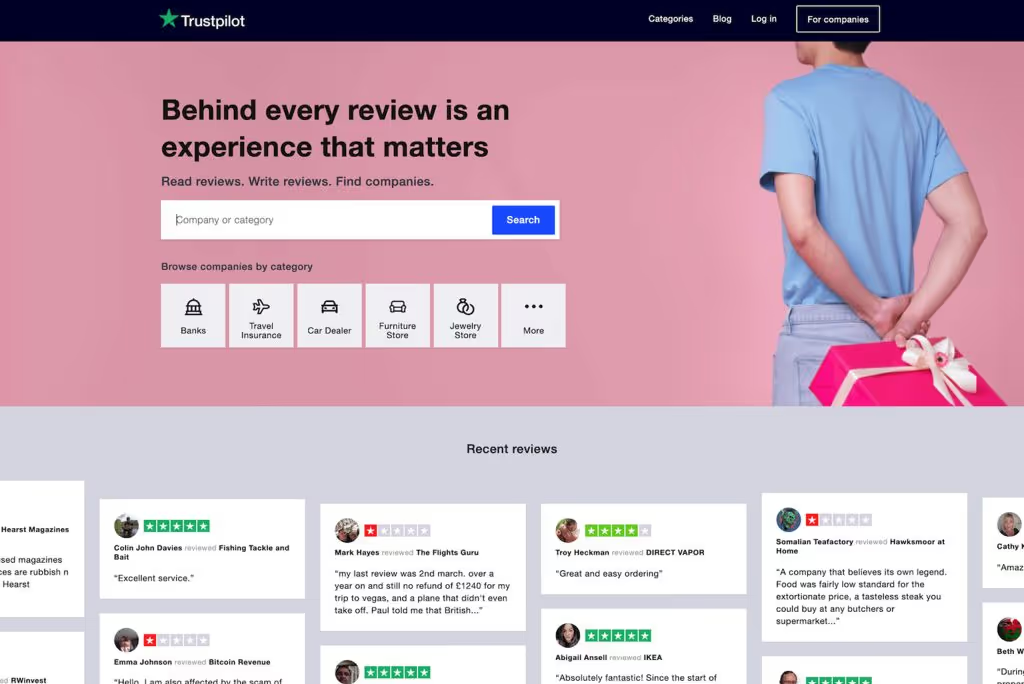The Power of Trustpilot for Boosting Premium Brand Reputation

In today's world, where every brand is competing to stand out in the market, building and maintaining a premium brand reputation is crucial. In this digital age, where customers have numerous options to choose from, trust and credibility are the key factors that can differentiate a brand from its competitors.
This is where Trustpilot reviews come into play. Trustpilot is a customer review platform that allows customers to share their experiences with a brand. These reviews not only help potential customers make informed decisions but also help brands boost their reputation. In this article, we will discuss how Trustpilot reviews can enhance a brand's reputation and why they are essential for premium brands.
We will also share some tips on how to leverage Trustpilot reviews to maximise their impact and drive growth for your business. So, let's dive in and explore the power of Trustpilot reviews for boosting premium brand reputation.
What is Trustpilot?
Trustpilot is a customer review platform that allows customers to share their experiences with a brand. The platform was founded in Denmark in 2007 and has since grown to become one of the leading review platforms in the world. Trustpilot has over 120 million reviews for over 529,000 businesses. The platform is free for consumers, and businesses can sign up for a free or paid account to manage their reviews and reputation.

Why Trustpilot reviews matter for premium brands
Trustpilot reviews matter for all businesses, but they are particularly essential for premium brands. Premium brands are associated with high quality, luxury, and exclusivity, and customers expect nothing but the best from them. Trustpilot reviews provide social proof of a brand's quality and credibility, which is crucial for premium brands. Positive reviews can help attract new customers, increase sales, and improve a brand's reputation. On the other hand, negative reviews can damage a brand's reputation, leading to loss of customers and revenue.
Trustpilot vs other review platforms
Trustpilot is not the only review platform in the market. There are several other review platforms, such as Yelp, Google Reviews, and TripAdvisor. However, Trustpilot stands out from the rest because of its focus on transparency, authenticity, and trust. Trustpilot has strict guidelines for reviews, and every review is verified to ensure its authenticity.
The platform also allows businesses to respond to reviews publicly, which helps to build trust and credibility with customers.
The impact of negative reviews
Negative reviews can have a significant impact on a brand's reputation, particularly for premium brands. Negative reviews can damage a brand's image, leading to loss of customers and revenue. However, negative reviews can also be an opportunity for a brand to improve its products or services. Responding to negative reviews publicly and addressing the issues raised can help to build trust and credibility with customers. It shows that the brand is committed to providing high-quality products or services and that it values its customers' feedback.
How to get more Trustpilot reviews
Getting more reviews requires a proactive approach. Here are some tips to help you get more reviews:
1. Encourage customers to leave reviews: After a customer makes a purchase, send them an email or a message asking them to leave a review.
2. Make it easy for customers to leave reviews: Include a link to your Trustpilot profile on your website, social media pages, and email signatures.
3. Offer incentives: Offer customers a discount or a free gift in exchange for leaving a review.
4. Respond to reviews: Respond to every review, whether positive or negative, to show that you value your customers' feedback.
Responding to Trustpilot reviews
Responding to Trustpilot reviews is an essential part of managing your reputation on the platform. Here are some tips to help you respond to reviews:
1. Respond promptly: Respond to reviews within 24-48 hours to show that you take customer feedback seriously.
2. Be polite and professional: Use a polite and professional tone in your responses, even if the review is negative.
3. Address the issues raised: Address the issues raised in the review and offer a solution or an explanation.
4. Thank the reviewer: Thank the reviewer for taking the time to leave a review and for their feedback.
Leveraging Trustpilot reviews for brand reputation
Leveraging Trustpilot reviews can help boost your brand reputation and drive growth for your business. Here are some tips to help you leverage Trustpilot reviews:
1. Share positive reviews on social media: Share positive reviews on your social media pages to showcase your brand's quality and credibility.
2. Include reviews in your marketing materials: Include Trustpilot reviews in your marketing materials, such as brochures, flyers, and website.
3. Use reviews in your advertising: Use reviews in your online and offline advertising campaigns to attract new customers.
4. Use reviews to improve your products or services: Analyze the feedback in your reviews to identify areas for improvement in your products or services.
Real examples of brands that have benefited from Trustpilot reviews
Several brands have benefited from Trustpilot reviews, including:
1. Bose: Bose has over 130,000 Trustpilot reviews, with an overall rating of 4.6 stars. Bose uses Trustpilot reviews in its advertising campaigns to showcase its quality and credibility.
2. Volvo: Volvo has over 60,000 Trustpilot reviews, with an overall rating of 4.5 stars. Volvo uses Trustpilot reviews to improve its products and services and to build trust with customers.
3. Harry's: Harry's has over 90,000 Trustpilot reviews, with an overall rating of 4.7 stars. Harry's uses Trustpilot reviews to attract new customers and to improve its products and services.
The future of Trustpilot and review platforms
The future of Trustpilot and review platforms looks promising. As more businesses realise the importance of customer reviews, review platforms like Trustpilot will continue to grow in popularity. However, the challenge for review platforms is to maintain their focus on transparency, authenticity, and trust. Review platforms must continue to ensure that their reviews are verified and that businesses have the opportunity to respond publicly to reviews.
Conclusion
Reviews are a powerful tool for boosting a brand's reputation, particularly for premium brands. Positive reviews can attract new customers, increase sales, and improve a brand's reputation. Negative reviews can also be an opportunity for a brand to improve its products or services. Responding to reviews publicly and addressing the issues raised can help to build trust and credibility with customers.
Leveraging Trustpilot reviews can help boost your brand reputation and drive growth for your business. Trustpilot and other review platforms are here to stay, and businesses that embrace them will reap the benefits.

.avif)



